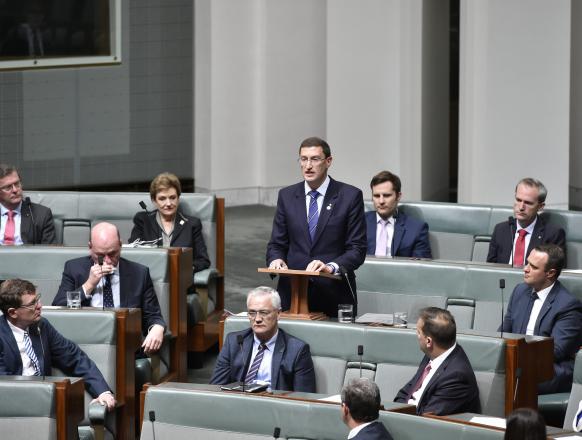I rise to support this bill. The Building and Construction Industry (Improving Productivity) Amendment Bill 2017 makes a welcome adjustment to the Building and Construction Industry (Improving Productivity) Act 2016. The ABCC act and the building code contained a two-year transition period which delayed the requirement, under the building code, for building and construction companies to have code- compliant enterprise agreements before they could tender for Commonwealth funded work. This transition period allowed construction companies to continue to use non-code-compliant enterprise agreements made before 2 December 2016.
This bill does two things. It decreases the transition period included in the act from two years to nine months. This will see the new code come into practice by the end of the year. The bill will also prohibit companies with non- code-compliant agreements from being awarded Commonwealth-funded building work after the commencement date of the bill.
These changes are directed at the massive union pressure placed on building companies to sign non-code- compliant agreements that contain non-productive and discriminatory terms. There is evidence that unions are already trying to dodge the code. Just days after the code was released, the CFMEU shut down 13 sites operated by Kane Constructions in Victoria. Kane is a construction company that has resisted intense coercion from the CFMEU to sign non-code-compliant enterprise agreements.
These changes are a welcome tightening of the legislation, to encourage and reward companies who comply with the new building code. They remove any unfair advantage that may have been paid to construction companies unable to hold out against the standover tactics of the CFMEU. They create a level playing field across the building industry.
In supporting this bill, I, unlike the member for Gorton, would like to commend Senator Hinch for listening to the construction industry in Victoria, for being responsive and for his appreciation of what the government is trying to achieve through the ABCC. As Senator Hinch said:
… the legislation was killing them—
the building and construction companies, he meant. It doesn’t get much clearer than that.
The re-establishment of the Australian Building and Construction Commission last year was a signature achievement of the coalition. Despite the best efforts of unions and the Labor Party, the ABCC is back. According to the Australian Bureau of Statistics, nearly half, 42 per cent, of all working days lost to industrial disputes are in the construction industry. In September 2016, the rate of industrial disputes in the construction industry was nearly six times the Australian average. These disputes are estimated to add 30 per cent to the cost of infrastructure. As of 30 January 2017, there were 110 CFMEU officials before the courts, which in recent years have imposed fines of more than $8 million on the union. When the previous ABCC existed, the performance of the building and construction industry improved. Productivity improved by 30 per cent. Disputes fell from five times the all-industries average to double the average. Under the Rudd-Gillard-Rudd government, the ABCC was abolished by the then employment minister, Bill Shorten, at the behest of the CFMEU. Standards of behaviour in the building industry deteriorated markedly. Violent disputes became more common. Thuggery and disregard for the law became commonplace. Productivity flatlined.
The re-establishment of the ABCC last year put back in place a regulator with strong and effective powers. It established a commission with the power to monitor compliance with the law by the building and construction industry. The ABCC will be able to take enforcement action and promote appropriate standards of conduct across the industry. The commission will have the power to eliminate coercion and discrimination in the industry. It will take action against standover tactics and the strongarming of builders and workers who are trying to do the right thing. It will enforce better levels of governance across the industry by making it an offence to intentionally hinder or obstruct an authorised officer seeking information or documents.
There is no question of the need for the ABCC. Just like the Cole royal commission laid bare the truth of the building and construction industry in the early 2000s, leading to the original establishment of the ABCC, the Royal Commission into Trade Union Governance and Corruption, the Heydon royal commission, showed just how low Australia’s unions had sunk, and the CFMEU and the AWU were among the worst of the lot.
The report of the 2015 Royal Commission into Trade Union Governance and Corruption is a great read. It is a real page-turner. Just when you think it cannot get worse, just when you think that you must have reached the peak of union corruption and failure of governance, there is another example that is even more outrageous or unbelievable.
Commissioner Heydon did a fantastic job in very difficult circumstances, and I commend him for his patience, his fortitude and his significant efforts in putting together a comprehensive report. Commissioner Heydon is one of the outstanding lawyers of his generation. The personal attacks from those opposite and from the trade union movement were unprecedented and outrageous, particularly for someone who, like his celebrated father, Sir Peter Heydon—the public servant who was most responsible for the ending of the White Australia policy— has given so much service to his country.
The report is not an insignificant achievement when you consider what he was up against. There was perjury – much perjury. Some union officials brazenly admitted to it and said they would plead guilty to charges of perjury. A huge amount of the testimony given in hearings was false to the knowledge of the witnesses. There was destruction of documents, most blatantly by the CFMEU. The CFMEU in Queensland caused a number of tonnes – tonnes – of documents to be removed from the CFMEU’s Brisbane office and disposed of on the same day that the CFMEU received a notice to produce from the royal commission. Despite this obstructionist behaviour, the commission found plenty of evidence of trade union corruption and the complete failure of anything approaching governance.
Commissioner Heydon found widespread misconduct by six unions across every state and territory in Australia, except for the Northern Territory. He found financial misconduct. He found breaches of legal duty. He found misuse of union funds for personal gain and purposes. He found misrepresentation of membership numbers. He found misconduct on building sites. He found abuse of process. He found blackmail. He found death threats and bribery. Commissioner Heydon found:
This conduct has taken place among a wide variety of unions and industries. Those responsible have ranged in seniority from the most junior levels to the most senior … Of course what has been described is not universal. It may not even be typical. But you can look at any area of Australia. You can look at any unionised industry. You can look at any type of industrial union. You can select any period of time. You can take any rank of officeholder … You can search for any type of misbehaviour. You will find rich examples over the last 23 years in the Australian … union movement.
Again, he said:




